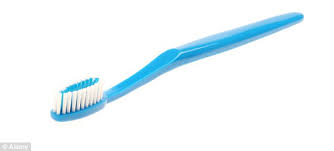The useful life of a toothbrush is usually less than a month. It is therefore advisable to buy several toothbrushes for each member of the family in advance and replace them with new one after some time. About 100 million bacteria can lurk on an uncovered toothbrush! TUNDE OGUNTOLA writes on some ways to care for, and store your toothbrush properly to minimize the chances of illness.
Don’t brush where you flush
Where you store your toothbrush is important. Most people keep their toothbrushes in bathrooms, where the toilet is very close to the sink. The truth is every time you flush, bacteria are released into the air, and you don’t want that bacteria to get on your toothbrush.
Expert advice keeping your toothbrush very far from the toilet as possible. Keep it in a medicine cabinet if possible, and always close the toilet lid before flushing to minimize the spread of bacteria onto your toothbrush.
Toothbrush holders
Your toothbrush holders as well can pick up bacteria that are spread by toilet flushing. A recent study found that toothbrush holders are the third-most germy household items (behind dish sponges and kitchen sinks). Remember to clean your toothbrush holder regularly to remove germs.
Toothbrush storage tips
After you’ve moved your toothbrush as far from the toilet as possible, and cleaned your toothbrush holder, here are some storage tips to keep your toothbrush as germ-free as possible:
Rinse your toothbrush thoroughly with tap water every time you use it.
Let your toothbrush dry thoroughly between brushings. Don’t use toothbrush covers, which can create a moist enclosed breeding ground for bacteria.
Keep your toothbrush upright in a holder, rather than lying it down.
Don’t ever use anyone else’s toothbrush, or let someone use yours.
Keep toothbrushes separate. If toothbrushes touch they can swap germs.
Toothbrush sanitizers
There are products available that claim to sanitize your toothbrush. Some use ultraviolet light; others are sprays or rinses. There are even brushes with built-in antibacterial bristles. While some of these products do kill some germs, there is no evidence using them will reduce your risk of illness.
Change is good
Experts recommends replacing your toothbrush every three to four months, or more often if bristles become frayed, if you are sick, or if you have a weakened immune system. For an electric toothbrush, replace the head as frequently as you would a regular disposable brush. Children’s toothbrushes may need to be replaced more often than adult brushes.
Practice good oral care
Remember, bacteria cause gum disease, and decay, and bad breath, hence, experts recommends brushing and flossing as often as possible, and rinsing your mouth with an antibacterial mouthwash before you brush to eliminate bacteria before they get onto your toothbrush.
Hello Visitors!
Jobs and similar opportunities like this are listed daily on our platforms, and as such, it is important to take due advantage of that.
Here is how:
- Kindly Click here and add your valid email address to get updates directly to your mail. Remember to click on the confirmation link in your mail.
- Next, click here to visit our jobs listing Portal for latest Job positions.
- Alternatively, you can visit here to see top companies recruiting, or check out latest jobs in your state or latest Jobs in your industry of interest.
- Pick your area of interest.
- Read the requirements,
- Next, apply.
- Remember to always share this article with others.
- If website is down, kindly subscribe to our email notification, we will notify you once it is up.


